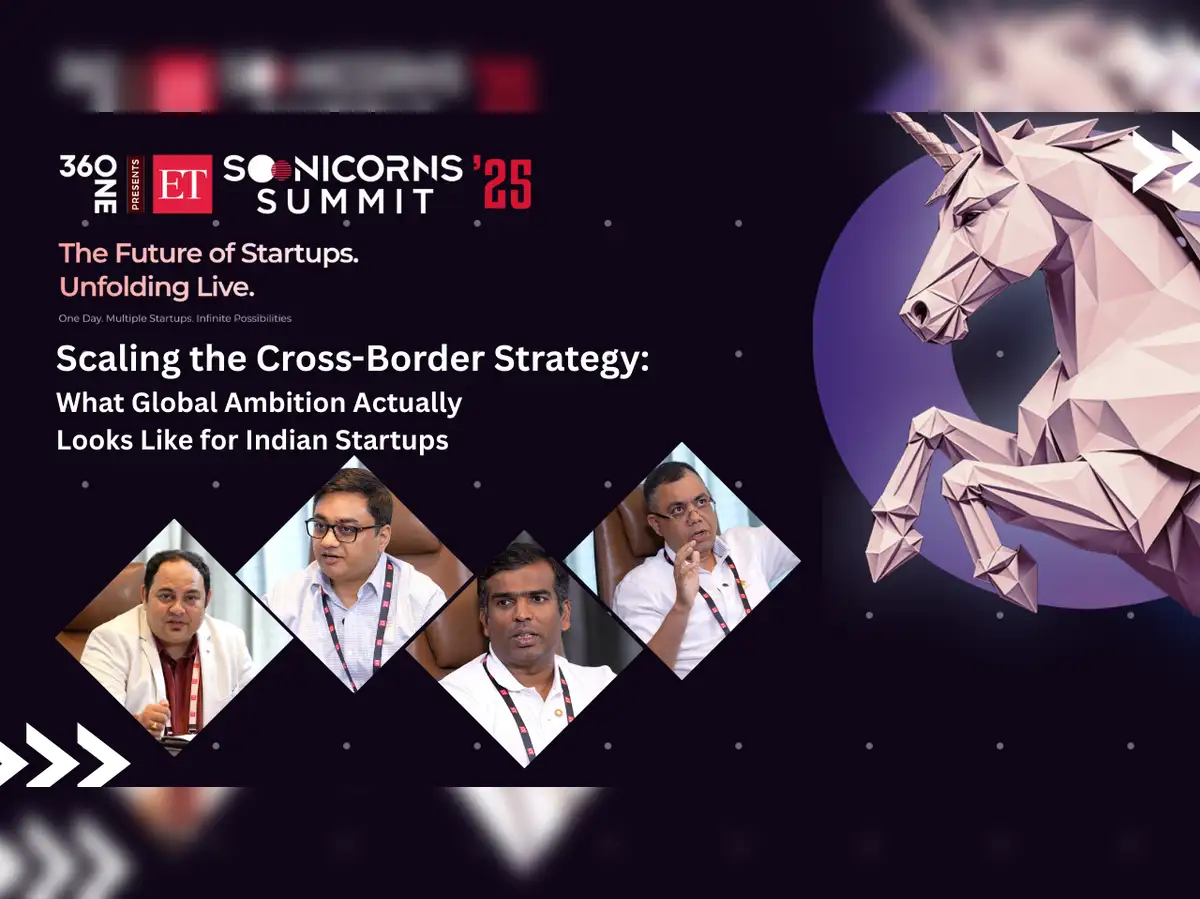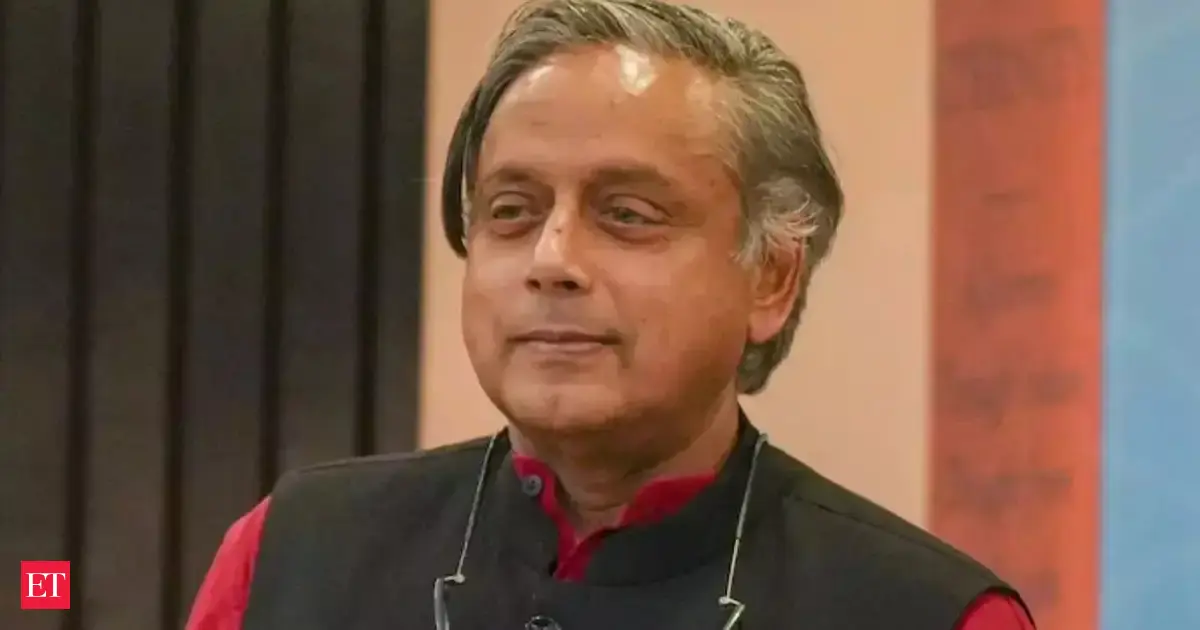From Bharat to the world: The cross-border scale playbook for Indian startups decoded at the ET Soonicorns Summit 2025
By Pranbihango Borpuzari
Copyright indiatimes

“First, we cater to India. If we can crack the Bharat customer, expansion globally is easier. India is like mini Europe: languages, cultures, mindsets vary by state. Solve for India, and you solve for the world,” said Himanshu Gupta, Co-Founder and COO of WeRize, a full-stack financial services company.Similar to an e-commerce marketplace, WeRize offers a spectrum of financial services to the “Bharat customer,” from personal and business loans to loans against property, insurance, savings accounts, digital gold, and fixed deposits. At a closed-door roundtable titled ‘Scaling the Cross-Border Strategy: What Global Ambition Actually Looks Like for Indian Startups’ at the Economic Times Soonicorns Summit 2025, Gupta elaborated on the nuances of addressing this vast, heterogeneous market.“We’re playing in underserved, unserved segments in Tier II, Tier III, and beyond. Banks may exist, but access to financial services is limited. India has the best financial services stack—think UPI (United Payments Interface). Indian banks are 20 years ahead; US banks are still on mainframes,” Gupta explained, highlighting how traditional financial solutions often fail to address the unique needs of the Indian diaspora and how building for this audience can lay a foundation for global expansion.Cracking the Bharat consumer to defining global ambitionThe discussion, moderated by Pranbihango Borpuzari, Associate Editor at EconomicTimes.com, sought to decode what “global ambition” truly means for Indian startups, particularly tech companies, in a world shaped by shifting macroeconomic realities and geopolitical policies. Speakers explored the implications of US policy shifts under Donald Trump and how India can leverage its advantages to scale globally.Raghunandan G, Founder of Zolve, recounted a personal moment that sparked his company’s global focus. It was when he was having dinner with a friend in the US, and the friend took out cash to pay, a realisation dawned on him that “Indians couldn’t use their credit history in the US”. That’s where the seeds for Zolve were born, “building for Indians going to the US”.He elaborated, “We never started off to be a global company per se. There was a problem, and we solved it, and the market took us wherever we needed to go.” This perspective encapsulates a recurrent theme: global expansion is rarely the starting point; it is an outcome of solving a real problem and achieving traction at home.When is India ready for the global stage?The question then arises: at what stage should a startup, having solved for India, consider going global? Has artificial intelligence (AI) changed the calculus of market entry?Manish Arora, Co-Founder of Efficient Capital Labs, outlined a practical framework for tech startups, particularly software-as-a-service (SaaS) and AI-driven businesses. “For some businesses, if you are very clear in terms of your vision, you could start outside the country, because, again, the product may be such that you are solving a problem for a particular market which may not exist locally.”For companies with proven success in India, Arora stressed three critical considerations before venturing abroad: “You should have a good idea that you are not learning things in a way that is very specific to India. There has to be some element of internationalisation. You can’t run a business on jugaad and then try to take it outside the country. What kind of standardisation have you achieved, what kind of product market fit you have, and what your go-to-market motion looks like.”Regarding operational challenges abroad, Arora noted, “If your salespeople are not well conversant with the cultures of the markets outside, or if you are using WhatsApp to sell, that will not translate very well to a different market.”And on capital requirements, he added, “What kind of capital do you have available to support that global ambition? Because if your product requires fundamental customisation for different markets, you need partners, local customisation, and language changes.”AI as a lever for global scalingOn the question of AI, Arora highlighted its dual role as both enabler and leverage: “AI is a form of leverage. Just as capital is a form of leverage, AI is a form of leverage. AI can help you build capabilities a lot faster… and even reduce the need to invest in localising your product as much. AI can help you with both the build part as well as the sell part.”He further emphasised AI’s particular advantage for Indian startups: “India has been historically a capital-starved market. AI is a form of leverage, so it will help places like India even more, provided we are good at adopting it. The cost of AI, which is a form of leverage, is actually lower in India, so I think it will actually be a really good thing for our global ambition as a startup community.”Zolve’s Raghunandan G reinforced Gupta’s and Arora’s observations, highlighting that the challenge isn’t merely replicating successful Indian models globally. “Replicating successful models in India built for the masses—Oyo, Zomato, Ola—or building SaaS for US markets and then replicating elsewhere aren’t the challenges; the critical thing is to understand the potential of what we have already built.” He illustrated this with the example of NinjaCart, a startup that is built on a tech platform to sell produce from farmers to consumers quickly. “India is big, so they didn’t need to go global, but a Brazilian company wanted to do this and couldn’t build the tech. They came to India, licensed NinjaCart technology, and essentially gave equity in Jakarta. This is like Yahoo’s investment in Alibaba,” he explained.“India has built phenomenal companies over decades, whether Zepto, Zomato, Rapido—these are products the rest of the world doesn’t fully observe. The government could provide a platform for people to come, observe, experience, and take these innovations globally. Catering to 1.4 billion people is amazing,” he added.Navigating policy shifts: The Trump questionPolicy shifts in key markets remain a critical consideration. On the Trump-era question of immigration and trade, Manish Arora noted that President Trump is essentially pursuing an “America First” agenda, with much of his support coming from Middle America—people who have been negatively affected by outsourcing and related trends. This, Arora explained, naturally has implications for immigration. While it may make it somewhat harder for Indian entrepreneurs to enter the US, the larger impact is likely to be felt by students who might become entrepreneurs in the next 10–15 years, or by employees deployed by companies such as TCS or Infosys.Arora also highlighted reasons for optimism in tech-led sectors, particularly AI. He pointed out that top-tier entrepreneurs with a proven track record are largely unaffected. Even if visa costs rise, the impact is marginal in the broader context. Today, areas such as AI present significant opportunities because they do not require large-scale movement of people. However, since India does not have a natural competitive advantage in people mobility, he emphasised that startups will need to build one by leveraging AI effectively.Taking a macro perspective, Raghunandan G observed that the global pendulum had swung too far in one direction and is now shifting back. He noted that people are beginning to recognise the value of migration and the costs associated with imposing high tariffs, which ultimately affect US consumers. As citizens start to feel these impacts, governments will be compelled to adjust their policies. For India, he argued, the US is not the only trading partner, and this scenario serves as a wake-up call. “Startups should hedge their bets, reduce dependence, and treat the situation as an opportunity to strengthen their position,” he surmised.Himanshu Gupta added that India has historically responded well to crises, citing examples such as COVID-19 and the economic liberalisation of 1992. He noted that Trump’s policies are reshaping the global order, affecting not just India but also Europe, Russia, and China. The focus, he explained, is increasingly on trade and emerging technologies. India’s strength lies in its skilled workforce, and by remaining patient and concentrating on self-reliance—not just in manufacturing but also in technology—the country can secure a strong and prosperous future.Product-market fit, capital, operational principles In his closing remarks, Gupta offered a contrarian view of India’s venture capital landscape, noting that most VCs are foreign and determine where capital flows, with very few focusing on the Bharat customer. He emphasised that India is highly heterogeneous, with different regions, cultures, and economic realities. According to Gupta, solving domestic problems first and building for Indian customers is crucial. Startups should develop tech layers and operations tailored to India, achieve product-market fit and profitability, and only then consider scaling globally.The moderator highlighted the strategic advantage of this approach, observing that once founders have built for India, they can leverage that experience and capital to explore opportunities abroad.Arora underscored the importance of honest assessment and self-reflection. He advised that startups evaluate whether a problem exists globally or is only local, validate their assumptions in the market, understand the scale of the opportunity—which drives capital strategy—and adopt a global mindset with curiosity and the ability to refine hypotheses quickly.Raghunandan G focused on operational principles, stressing that decision-making must be localised. He recommended building teams that combine local hires with existing staff to empower on-the-ground decisions and travelling to observe markets firsthand.Gupta added that collaboration is key, advising startups to work with subject-matter experts and local entrepreneurs rather than going it alone. He emphasised that product-market fit, capital, and a strong team are prerequisites for successful global expansion.The discussion at the ET Soonicorns Summit 2025 reinforced a compelling narrative: India’s domestic market, with its scale and heterogeneity, serves as a testing ground for global-ready startups. When combined with AI as a form of leverage, strategic capital deployment, and careful observation of geopolitical shifts, Indian startups are methodically charting a path from serving the Bharat customer to competing on the world stage. Thoughtful scaling, the panel concluded, hinges as much on mastering homegrown complexities as it does on seizing international opportunities.The ET Soonicorns Summit 2025, India’s largest congregation of soonicorns, returned for its fourth edition to Bengaluru on August 22.360 ONE is the Presenting Partner of the ET Soonicorns Summit 2025, with Shiv Nadar University as the Ecosystem Partner, Raymond as the Wardrobe Partner, Pi42 as the Gold Partner, Bank of India as the Banking Partner, Tracxn as the Knowledge Partner, and K-Tech Startup Karnataka as the State Partner. The Gifting Partners of the Summit are The Mind & Company, Plum, Clinikally, EM5, and True Elements.



